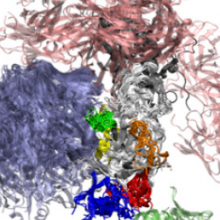A vaccine which is effective against the HIV virus is considered to be the best solution to the ongoing global HIV/AIDS epidemic. In the past thirty years, numerous attempts to develop an effective vaccine have been made with little or no success, due, in large part, to the high mutability of the virus. More recent studies showed that a vaccine able to elicit broadly neutralizing antibodies (bnAbs), that is, antibodies that can neutralize a high fraction of global virus variants, has promise to protect against HIV. Such a vaccine has been proposed to involve at least three separate stages: First, activate the appropriate precursor B cells; second, shepherd affinity maturation along pathways toward bnAbs; and, third, polish the Ab response to bind with high affinity to diverse HIV envelopes (Env). This final stage may require immunization with a mixture of Envs. In this paper, we set up a framework based on theory and modeling to design optimal panels of antigens to use in such a mixture. The designed antigens are characterized experimentally and are shown to be stable and to be recognized by known HIV antibodies.
